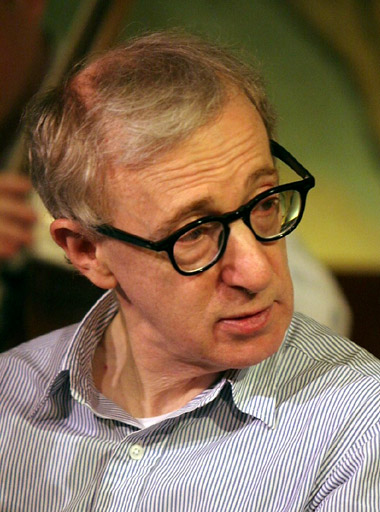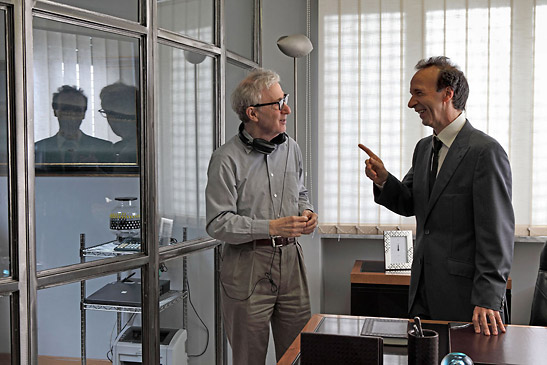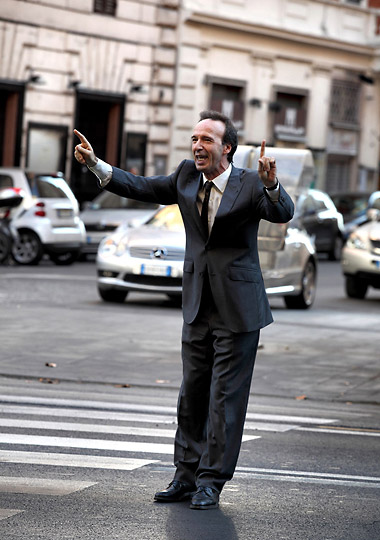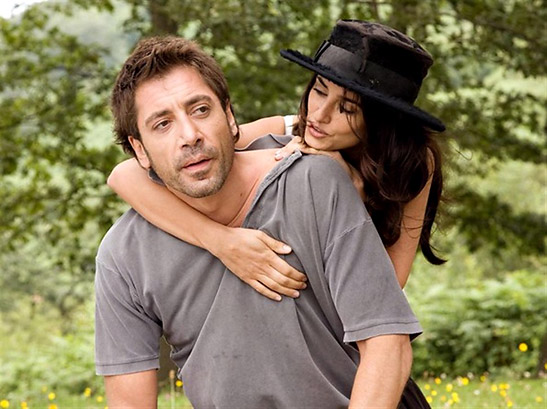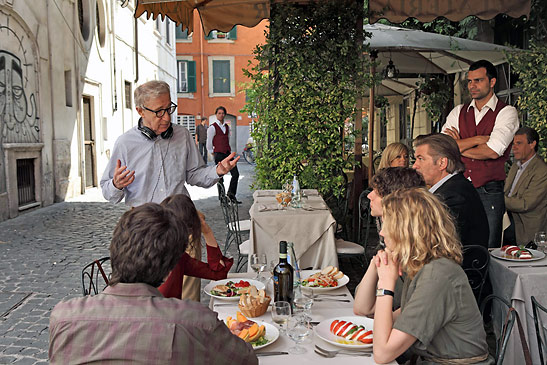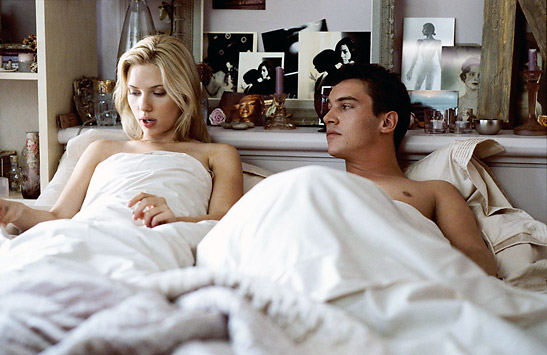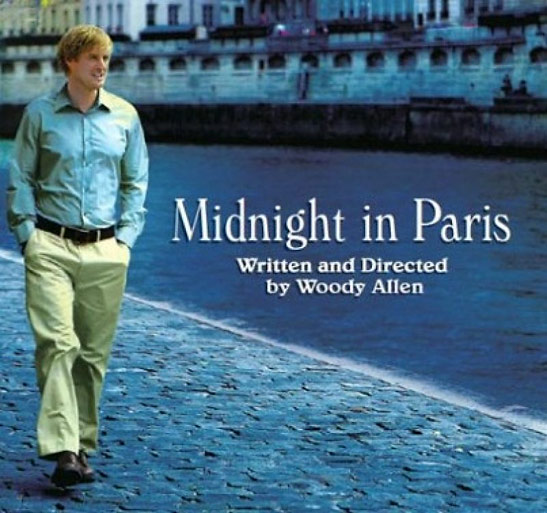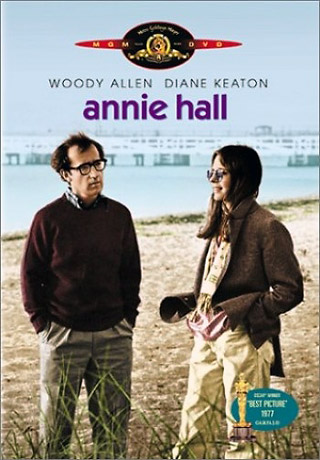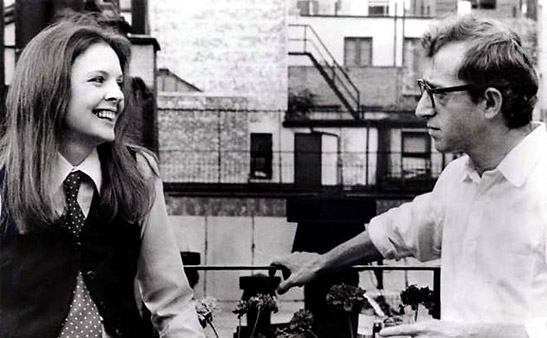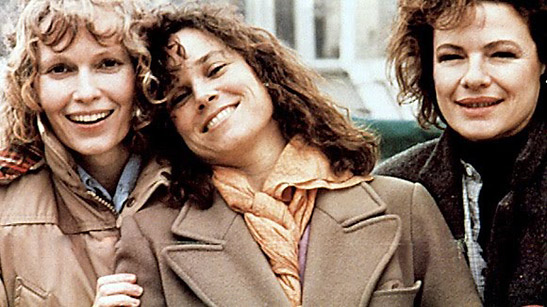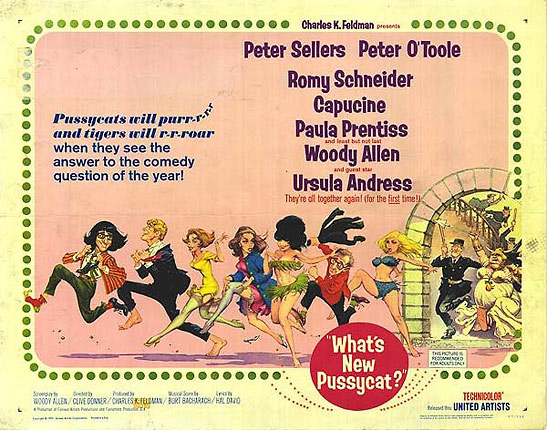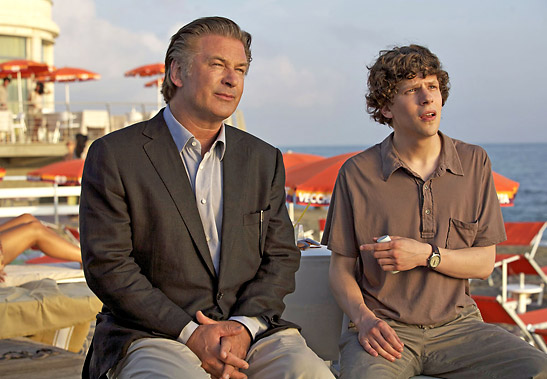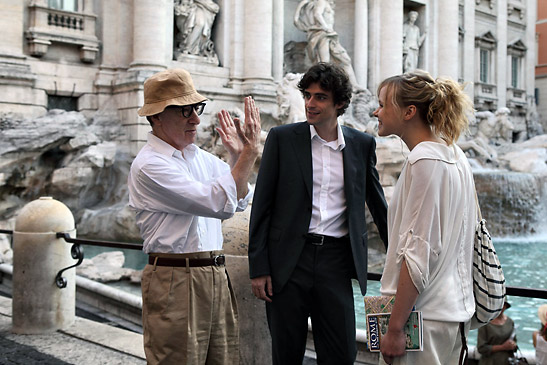 |
 |
|
 |

|
Woody Allen –
Auteur Extraordinaire By Beverly Cohn
Allen was in Los Angeles recently and held a press conference with most of his cast to publicize his latest film "To Rome With Love," which co-stars the writer/director himself, Alec Baldwin, Roberto Benigni, Penelope Cruz, Judy Davis, Jesse Eisenberg, Greta Gerwig, Alessandra Mastronardi , Antonio Albanese, Fabio Armiliato, and Ellen Page. Although the actresses participated in the press conference, only the Woody Allen portion is being presented here and has been edited for continuity and print purposes.
Do you choose actors who are compatible with your style of humor? Allen: They don't have to be. I cast them because they're perfect for what I've written. I didn't think Roberto Benigni would be compatible with me. I thought that I would have a difficult time with him and that he would be irrepressible and I'd never be able to get his attention. I thought he's be running around and be crazy but in the end, it turned out that he was quite intellectual and quite poised and quite a pleasure to work with. Why did you decide to be in front of the camera again? Allen: Only because there was a part for me. (Laughter) As I've gotten older, the parts have diminished. I liked it when I was younger because I could always play the lead in the movie and I could do all the romantic scenes with the women and it was fun and I liked it. Now I'm older and reduced to playing the backstage doorman or the uncle or something and I don't really love that. (Laughter) You've said that you write ideas on notes and put them in a drawer. Was "To Rome With Love" one of those? Allen: I have a lot of notes on ideas that come to me in the course of a year and I write them down and throw them in a drawer. Then I go and look at them and many of them seem very unfunny and foolish and I can't imagine what I was thinking when I originally did it. But sometimes I'll pull out an idea from a note written on a matchbook or on a piece of paper that says 'a man who can only sing in the shower' and it will occur to me that this could make a funny story, and that's what happened with this film. How did you find Fabio Armiliato who plays the undertaker who can only sing in the shower? Allen: We searched a long time to find somebody who could actually sing opera and who could speak a little English and could act a little bit. Fabio (a famous Italian tenor) had all those qualities. He lived in New York for a year with his wife and spoke English pretty well. He was a pretty good actor and had a lovely singing voice, so we were very lucky.
What is it about Rome that made you decide to make the setting there? Allen: There are two things: One is I have been talking about making a film in Rome for years with the people in Rome who distribute my films. Finally they said, look come and do it and we'll put up all the money necessary to make the film. I jumped at the chance because I wanted to work in Rome and it was an opportunity to get the money quickly from a single source. Is it an inevitable that if you shoot in Rome you are eventually going to shoot in a location from a Fellini movie? Allen: Probably inevitable. I didn't know Rome very well and the art director went around finding pretty locations and interesting locations and I had no idea if any of them had been used in other movies. I was seeing many of the places for the first time. Can you talk about why you always use music in your movies? Allen: I'm a big believer in music in movies. It covers a multitude of sins. Now a really great director like Ingmar Bergmann did not believe in music and thought that using music in film was barbaric. His films were great enough so he didn't need any outside help. I need help and noticed that in one of the first movies I ever made, "Take the Money and Run." There were scenes that were dying when I looked at them in the cutting room and the editor said put a piece of music behind it. He put this record on and all of the sudden, something that was so boring originally, came to life. When you start dropping in a little George Gershwin or a little Mozart, things suddenly become lively and magical.
Why do you tell your actors to improvise? Allen: I have great faith in actors and when they improvise it always sounds better than the stuff I write in my bedroom. I'm alone, isolated in New York and when we get on the set, it feels different to the actors and when they improvise, they make it sound alive. In Vicky Cristina Barcelona, Javier (Bardem) and Penelope improvised whenever they felt like it. They would speak in Spanish and I don't speak a word of Spanish and to this day, there are scenes in that picture that I have no idea what they're saying. (Much laughter) I just assumed they knew what they were doing professionally and I was right.
How closely do you work with the cast? Allen: I try to avoid the cast because they come up with these questions and I either don't know the answer or don't want to give them an answer. So I avoid speaking to the actors as much as possible. (Laughter) Why do you love making films? Allen: Real life is generally much duller and inevitably sadder most of the time, but in film you control everything that's going on so you can indulge the most fantastic, romantic, escapist kinds of feelings and fantasies. You can do anything you want, so that's why it's very seductive and pleasurable to earn your living making movies, because you're not living in the real world. You wake up every morning and you go to work and you're surrounded by beautiful women and scintillating guys who are handsome and witty and gifted and you make up stories and everybody has costumes and the music is beautiful. You live your life not in the real world and you create something that's completely fabricated and escapist and it's great, but it's not real, but it's fun.
For decades you said you would never leave New York to make a film, but for the last eight or ten years, why have you been shooting in Europe? Allen: It was strictly financial. The first one was "Match Point" which was not a funny story, but they gave me the money to make it in London and I was happy to make there. Then I found that other countries started calling me.
Barcelona wanted me to make a film and then Paris and Rome. So it's an interesting experience and the change of venue cannot do anything but help. I made thirty or forty pictures in New York and then suddenly you find yourself working in London or Barcelona or Rome and the necessity of accommodating to these exotic new surroundings forces you into areas that you would not have otherwise explored. It gives it a certain freshness and exuberance.
I've been lucky that the films that I've made in foreign countries have been coming out good and I'm sure the fact that I'm not making them in New York has been one contributing factor. I think "Match Point" would have worked in New York and I had originally written it for New York, but doing it in London, gave it certain freshness. I wasn't again shooting in Central Park or on Broadway or Park Avenue and that alone made a contribution, just as Rome in this picture, the scenery and the very Roman sensibility, makes a contribution to the picture that's beyond anything I can contribute. It's just pleasurable for the viewer to watch a story unfold in that atmosphere. As long as that works for me, and they keep putting the money up, I'll do it. "Annie Hall" is considered the quintessential Woody Allen. Would you agree? Allen: When "Annie Hall" started out, that film was not supposed to be what I wound up with. That film was supposed to be what happens in a guy's mind and you were supposed to see a stream of consciousness of his mind. I did the film and it was completely incoherent and nobody understood anything that went on.
The relationship between Diane Keaton and myself was all anyone cared about. That was not what I cared about. That was one small part of another big canvas that I had in mind and in the end, I had to reduce the film to just me and Diane Keaton and that relationship. So I was quite disappointed in that movie as I was with other films of mine that were very popular.
"Hannah and Her Sisters" was a big disappointment because I had to compromise my original intention tremendously to survive with the film. So, you're asking the wrong person.
Of all the films you've made, is there one that is most memorable for you? Allen: You know when you make a film, it's like a chef that works on a meal. After you work all day in the kitchen, dicing and cutting and putting the sauces on, you don't want to eat it and that's how I feel about the films. I work on it for a year. I've written it, I work with the actors, I edit, I put the music in, and I never want to see it again. When I begin a film, I always think that I going to make "The Bicycle Thief" or "Grand Illusion" or "Citizen Kane" and I'm convinced that this will be the greatest thing that ever hit celluloid. Then when I see what I've done, I'm praying that it's not an embarrassment to me. I've never been satisfied or pleased with a film that I've done. I made my first film in 1965 and I've never seen it since. I just cringe when I see them. I don't like them because there's a big gap between what you conceived in your mind when you're writing and you don't have to meet the test of reality. You're home and it's funny and it's beautiful and it's romantic and dramatic and then you have to show up on a cold morning and the actors are there, and you're there, and you don't have enough of this, and this goes wrong, and you make a wrong choice on something, and you've screwed up here, and see what you got the next day, and you can't go back. There's such a difference between the idealized film in your mind and what you wind up with that you're never happy. You're never satisfied. I'm always thankful that the audience bails me out and have liked some of them in spite of my disappointment. (Laughter) So for me, I've never liked any of my films because they're always less than the masterpiece that I was certain I was destined to make.
In the film, Alec Baldwin takes a trip down memory lane. If you could go back in time, what would you tell your younger self? Allen: What would I tell myself? Don't do that! (Laughter) I would like to back in time, but just for lunch. (Laughter) I would not like to live in the past because there are all those drawbacks that I've mentioned in my other movies. You don't get anesthetic when you go to the dentist, you don't get antibiotics, you don't get the things that you're use to now - cell phones, televisions, faster ambulances - things that are very convenient. But it would be fun, if every now and then, just to meet a friend for lunch at Maxim's in Paris in 1900 or go back to 1870 just for a couple of hours and then come right back to Broadway.
Your character equates retirement with death. Do you feel the same way or would you step away from the camera? Allen: Retirement is a very subjective thing. There are guys I know that retire and they're very happy. They travel all over the world. They go fishing, they play with their grandchildren and they never miss work at all. Then there are other people, and I'm one of that kind, that likes to work all the time. I just like it and can't see myself retiring and fondling dogs. (Laughter) I love to get up and work. I have too much energy and too much nervous anxiety or something. So I don't see myself retiring. Now maybe I'll suddenly get a stroke or a heart attack and I'll be forced to retire, but if my health holds out, I don't expect to retire. The money could run out. (Laughter) It could be sooner or later the guys that back the films get wise and then they say that this is not really worth all the suffering and might stop giving me the money. But, I still wouldn't retire. I would still write for the theatre or write books. The Roberto Benigni character has fame suddenly thrust upon him. How do you feel about fame in your own life? Allen: As the chauffeur in the film says life is tough whether you're famous or not famous and in the end, it's probably of those two choices, better to be famous (Laughter) because the perks are better. You get better seats at the basketball game, you get better tables and reservations and if I call a doctor on Saturday morning, I can get him. There are a lot of indulgences that you don't get if you're not famous. Now, I'm not saying it's fair. It's kind of disgusting (Laughter) but I can't say that I don't enjoy it. (Laughter) There are drawbacks on being famous, but you can live with those. They're not life threatening. If the paparazzi are outside your restaurant or your house, and actors make such a big thing of it, and scurry into cars and drape things over their heads. You would think they were going to be crucified or something. So the bad stuff is greatly outweighed by the dinner reservations. (Roaring laughter) You've mastered the art and study of relationships in your films. What is the greatest lesson you've learned about love? Allen: I was saying to someone before about the important things in life you never learn anything. You know, you could learn technological things - you could learn about specific things, but real problems that people deal with in any subject - existential subjects or romantic subjects, you never learn anything so you make a fool of yourself when your twenty, you make a fool of yourself at forty, at sixty, and at eighty. The ancient Greeks were dealing with these problems. They screwed up all the time, just as people do now. All over the world relationships between men and women are very, very tricky and very difficult and you don't learn anything. It's not an exact science. You're always going by instinct and your instinct betrays you because you want what you want when you want it. So it's very tough. Very tough going and most relationships don't work out and don't last long and when you see one that's really lovely, it's a rarity. It's great that two people, with all their complex, exquisite needs, have found each other and all the wires go into the right places and it's great. So, I've learned nothing. (Laughter) After years and years of failure, I've not got anything to say. No wisdom. (Laughter) (The Journalists uncharacteristically applaud at
the end of the press conference) |
This site is designed and maintained by WYNK Marketing. Send all technical issues to: support@wynkmarketing.com

|











